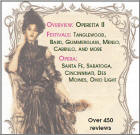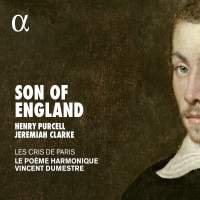Texte paru dans: / Appeared in: |
|
|
Outil de traduction ~ (Très approximatif) |
|
|
Reviewer: William
J. Gatens Henry Purcell’s untimely death in November of 1695 elicited many musical and literary tributes. One of the more elaborate was the Ode on the Death of Henry Purcell by Jeremiah Clarke (1674-1707) one of Purcell’s younger colleagues at the Chapel Royal. The ode takes the form of a pastoral scene that, according to a note in the manuscript, was staged at the Drury Lane Theater. The ode begins with Arcadian revels interrupted by a messenger (soprano) who announces the death of “Strephon”. At that point the revels turn into a lament. The work is a mosaic of brief sections for soloists and chorus with three instrumental movements including a multi-sectional overture. The solo vocal writing includes lyrical arias as well as passages of rhetorical declamation. A recurring choral refrain—”Then break our pipes and forever mourn”—imparts coherence to the second half of the ode. The remaining works on the program are by Purcell himself. The music for the funeral of Queen Mary (1695) involves music newly composed as well as revision of his settings of the Funeral Sentences from the Book of Common Prayer. His settings of the sentences may date from as early as the 1670s. His serene setting of the last one, “Thou knowest, Lord, the secrets of our hearts”, dates from 1695 and replaces the earlier setting cast in the anguished chromatic diction of the two other sentences. He also wrote a funeral march and instrumental canzona for the occasion.
The final work here is Welcome to all the Pleasures (1683), the earliest of his odes for St Cecilia’s Day. The performances leave little to be desired in technical polish, but sometimes they seem heavy handed. In the Clarke ode, the choruses seem disproportionately loud and heavy. The bass soloist is especially vehement, and not always to good effect. In contrast, the tenor soloist seems overbalanced so that he fades to near inaudibility at the ends of some phrases.
Some years ago I reviewed another recording that included the Clarke ode (Hyperion 66576; M/A 1993, p 180) performed by the Parley of Instruments and choir under the direction of Roy Goodman. On revisiting that recording, I found a certain heavy handedness, but not to the same extent as in the present recording. Towards the end of the ode there is an instrumental interlude with timpani called ‘Mr Purcell’s Farewell’. In the present recording, Dumestre treats the drum strokes as loud, visceral thumps. Goodman treats them as a quiet, mournful throb, and I think that is more effective. Dumestre and his singers present the Funeral Sentences with far greater delicacy and subtlety. | |
|
|
|
|
Cliquez l'un ou l'autre
bouton pour découvrir bien d'autres critiques de CD |
|




